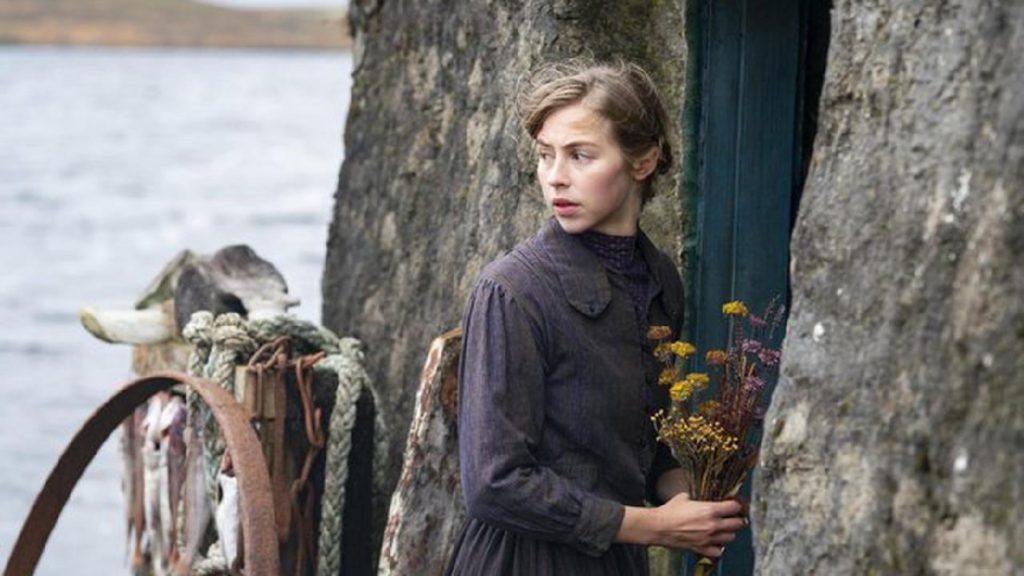Richie Adams, an American filmmaker best known for Indie features like Inventing Adam, makes his Scottish debut with an adaptation of John MacKay’s novel The Road Dance. It’s quite the side step from his previous works, but Adams directs his latest feature with the confidence of Scottish veterans like Danny Boyle or Bill Forsyth. The end result is something harrowing and challenging, but brimming with rich thematic melodrama.
Opening on a wonderful quote by poet Robert Louis Stevenson, the film is set in 1916 on the Isle of Lewis. Kirsty Macleod (Hermione Corfield) is a young woman who lives with her sister and mother in a close-knit community. Even though her mother tries to match her with different suitors, Kirsty is in love with Murdo (Will Fletcher), a WW1 fighter who wishes to take Kirsty to America for a new life. When conscription declares that he, and all other capable men on the island, must go to France to serve, the community holds a road dance to celebrate the men going to battle, an event Kirsty happily attends with Murdo.
Mad God – Edinburgh International Film Festival Review
But, during the dance, Kirsty is attacked and assaulted by an unknown assailant. Weeks after Kirsty discovers she is pregnant. But she cannot reveal this at the risk of being shamed and banished by the evangelical town. And so the film becomes a tense storm of anxiety as Kirsty tries to conceal her secret from everyone around her to avoid the wrath of her family and neighbours.
The first twenty five minutes or so of The Road Dance paint a rather joyful picture of the Scottish community. Laughter, dreams, and good spirits are aplenty, even in the face of impending anxiety as war looms over.
The accompanying music and cinematography, reminiscent of the idyllic visuals of 1989’s Venus Peter, add to the benevolent feel. But then the aforementioned tragedy occurs and the film’s tone, themes, and very palette completely inverse. It’s initially quite jarring, but then again that’s probably the mildest word to describe something so horrific. Besides, this choice allows the film to become a compelling melodrama that examines family, guilt, and the enormous societal pressures placed on women, both of the time period and, retrospectively, to this day.
Martyrs Lane – Edinburgh International Film Festival Review
From the get go, Adams does a good job at showcasing the connections and beliefs of this small community. We feel a part of the initially vibrant atmosphere, meaning when Kirsty’s world is changed, we feel the devastation almost as much as she does.
But because of the beliefs of those around her, and due to the constant fear that the war is bringing to this community, Kirsty has to suffer in silence for most of the film, afraid of what will happen to her and her family if the truth comes to light. It’s anxiety that only intensifies throughout the film as pregnancy is something that’s impossible to hide forever. We can actively see how trauma is changing Kirsty as a character, making the whole film an additional level of heartbreaking.
Muted colours and bleeker music accompany the change in tone wonderfully, in ways that reminded me a lot of William McGregor’s underrated welsh film Gwen, another film about women being oppressed by their community. What those films also have in common is that the dark melodrama are grounded by a heartfelt mother daughter relationship.
Faceless – Edinburgh International Film Festival Review
Kirsty’s mother Mairi (Morven Christie) is strict and staunch in her religious beliefs. So much so that we, and Kirsty, believe she will be the first to shun Kirsty if her pregnancy is discovered. But, without going into too much detail, the film becomes an examination on the link between belief and family, and how much the latter truly prioritises everything else. Through this, and the brilliant acting between Corfield and Christie, we get an impactful, meditated drama on love, grief, and strength in the face of prolonged trauma.
The film’s script can sometimes feel a little rushed, with plot points racing one after another, each getting harsher than the last. And the ending did feel a little too Hollywood for my liking. But, as I have not read the source material, this may just be a consequence of adaptation.
Regardless, this is a fantastic film with terrific acting, stellar filmmaking, and a lot of important societal commentary. It’s a difficult watch, but often the most important things to hear are also the hardest.

